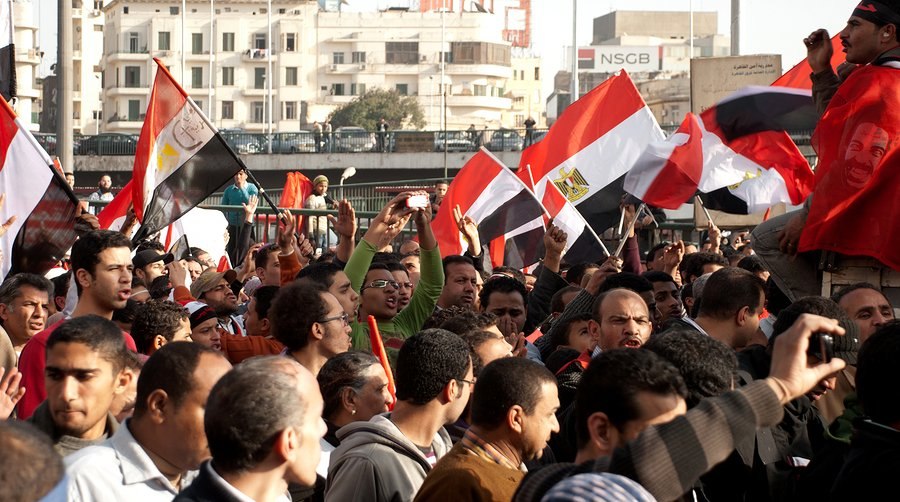
Mind the Gap: Egypt’s Widening Political Divide
- Two-thirds agree President's recent actions are bad for Egypt
- Half of respondents feel decree is an abuse of power
The Egyptian opposition party, the National Salvation Coalition, has called for and encouraged mass protests following the announcement of the unofficial tally of the recent constitutional referendum. The vote, which took place in Cairo, Alexandria and eight other Egyptian provinces, was the first round of voting on the controversial referendum. The vote had to be extended over two Saturdays because many members of judiciary remain on strike, refusing to oversee the election, in which 51 million people are registered to vote. A recent Al Aan poll, conducted by YouGov, investigates what Egyptians think about the current political climate, and how to navigate the country’s political landscape.
Egypt’s political crisis began in late November when President Morsi issued a constitutional decree granting him extensive executive power, while limiting that of the Supreme Constitutional Court. The move was met with fierce opposition in Egypt, with two-thirds of respondents agreeing that Morsi’s recent political actions are bad for Egypt as a whole. Moreover, just over half of respondents consider the decree an abuse of power; while one-third think it was not. Despite its reversal on December 8, the decree continues to sway public opinion against Morsi - 59 percent of respondents say it made them less likely to support Morsi, whose approval rating, according to the Al Aan/YouGov survey has dropped to 21 percent.
Morsi, who won the presidency with a narrow 51.7 percent majority last June, was tasked with bridging the country’s political divide and reengaging the millions of Egyptians that did not vote for him. Given the relatively low voter turnout and the narrow margin of Morsi’s victory, it is not surprising that three-quarters of Egyptians say they do not feel represented by any Egyptian political party or coalition. However, when asked about the quality of presidential candidates, 38 percent say that several of them would have made good options; while one-quarter of respondents feel that none of the candidates did. Speaking of those in office, fifty-seven percent of respondents say they do not think that politicians care about public opinion, further suggesting many Egyptians feel politically disenfranchised.
While public opinion of Morsi has waned, many Egyptians continue to support the President, widening the country’s political divide. Among those interviewed who voted for Morsi, three-quarters say Morsi’s decree made them more likely to support the President and an equal percentage agree that Egypt is moving in the right direction. Those who voted for Morsi were also more likely to say that laws are respected in Egypt, with more than half indicating as such. When asked about the recent demonstrations in Tahrir Square, 41 percent of all respondents support the protests while 44 percent do not. However, among those who voted for Morsi, 80 percent are against the protests. Public opinion becomes even more polarized on the issue of the recent attack on the head office of the Muslim Brotherhood, which 91 percent of Morsi supporters and only half of non-Morsi supporters say they opposed.
Such bouts of violence and increased political tensions in Egypt have left many concerned about the country’s future. In fact, when asked what two issues concerned them most, respondents say political stability of the country and government corruption rank highest, with 32 percent each. It seems that regardless of political affiliation, Egyptians are wary of the current political climate, with many saying that their expectations for the current regime have changed for the worst, particularly of its ability to manage the national economy (53 percent), to keep peace amongst different communities in the country (42 percent), and keep safety and security on the streets (42 percent). Among Egyptians surveyed, three-quarters agree that recent political developments will have a negative impact on Egypt’s economy.
It seems clear that many Egyptians share the same concerns regarding the future of Egypt, but have very different opinions on how to tackle issues facing the country. Establishing and maintaining political and economic stability is a priority for many - two-thirds of respondents agree that improving the standard of living should be a top priority in Egypt. Respondents also agree on the need for strong leadership in Egypt - more than three-quarters of those surveyed say that what Egypt needs most is a few political leaders who know what is good for the country. However, not everyone seems to agree on the best way forward, which makes the outcome of the current referendum so controversial.
The official outcome of the referendum remains to be determined, although an unofficial tally suggests that the constitution will pass. While the opposition continues to gain momentum in Egypt, political indifference and an inability to effectively mobilize supporters to vote threaten its effectiveness. Morsi, however, may succeed in passing the constitution, largely because of the Muslim Brotherhood’s ability to mobilize its supporters to participate in the vote. Irrespective of whether or not the constitution is adopted, the challenge to build political responsiveness and restore confidence in Egypt’s ruling party will remain.
The above results are based on a survey for Al Aan TV conducted by YouGov in Egypt between December 5th and 12th. The sample covered 1,060 urban adult Egyptians, aged 18+.